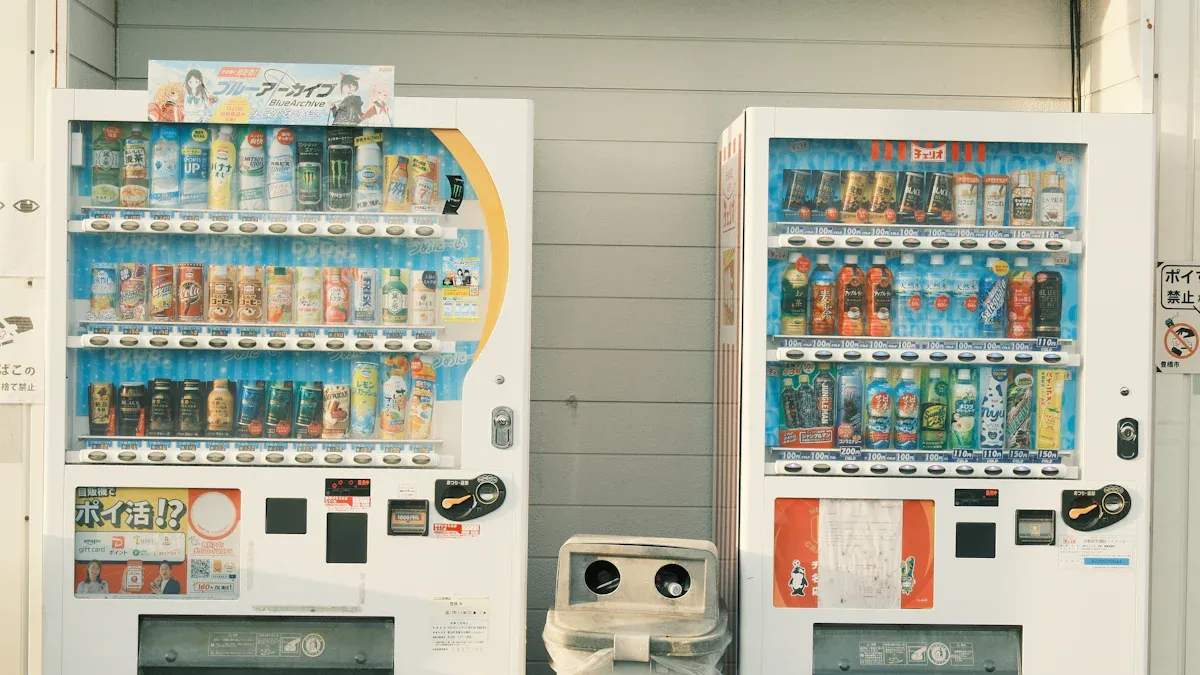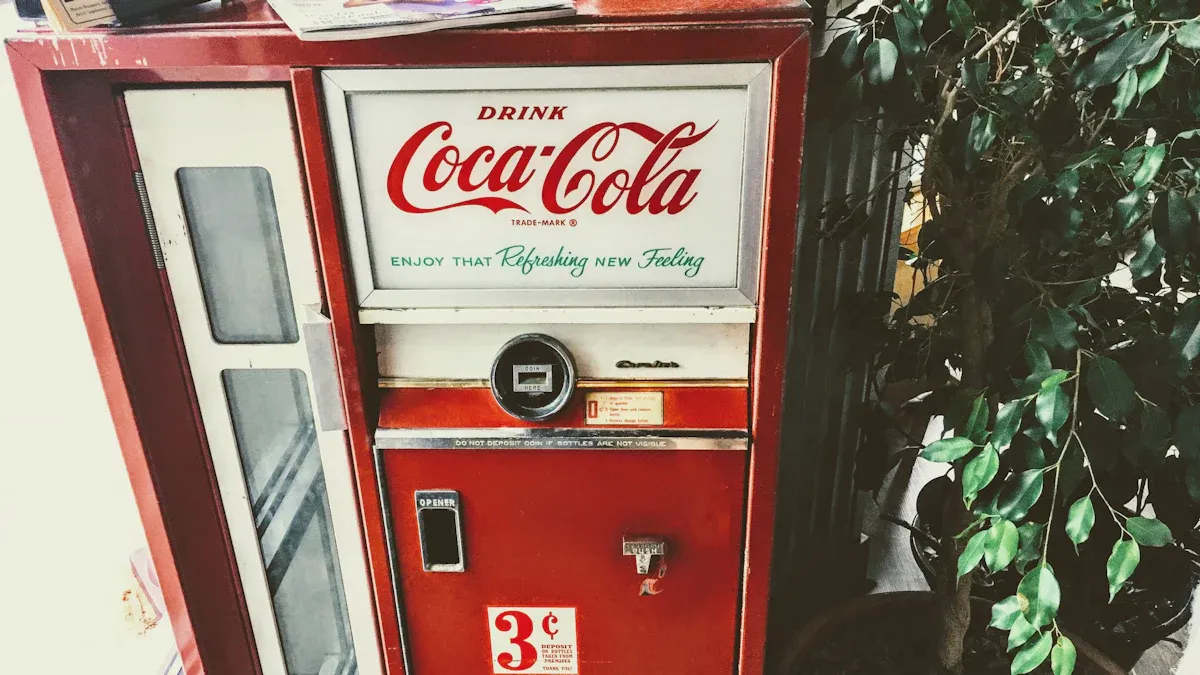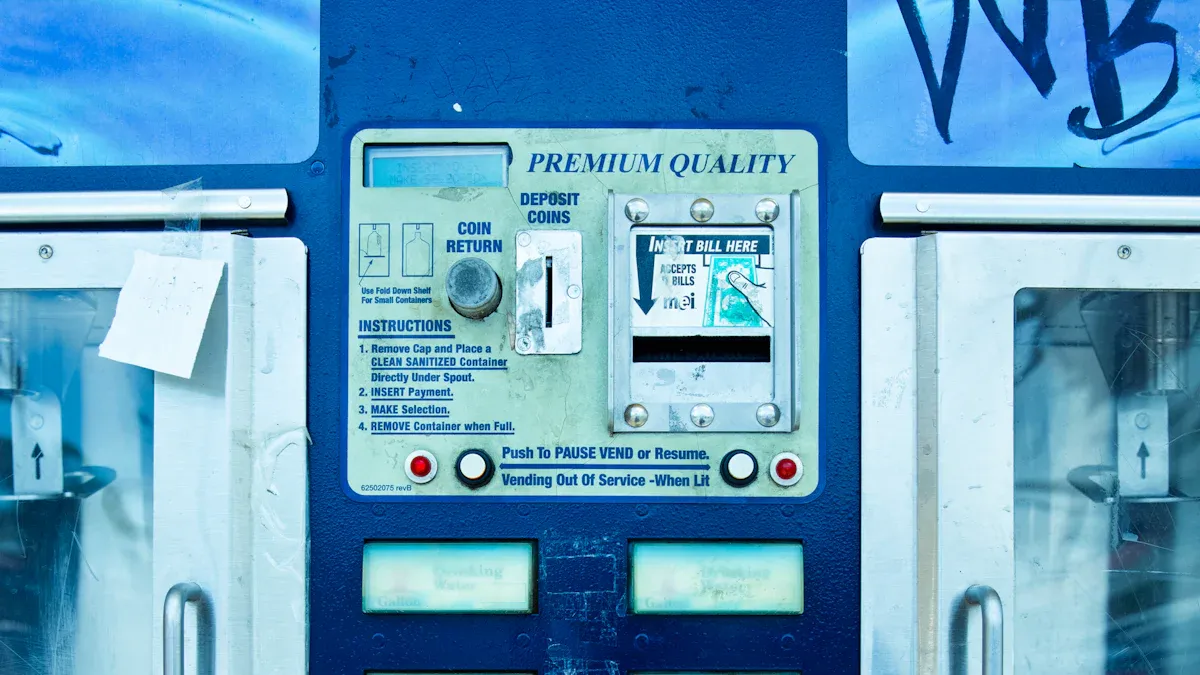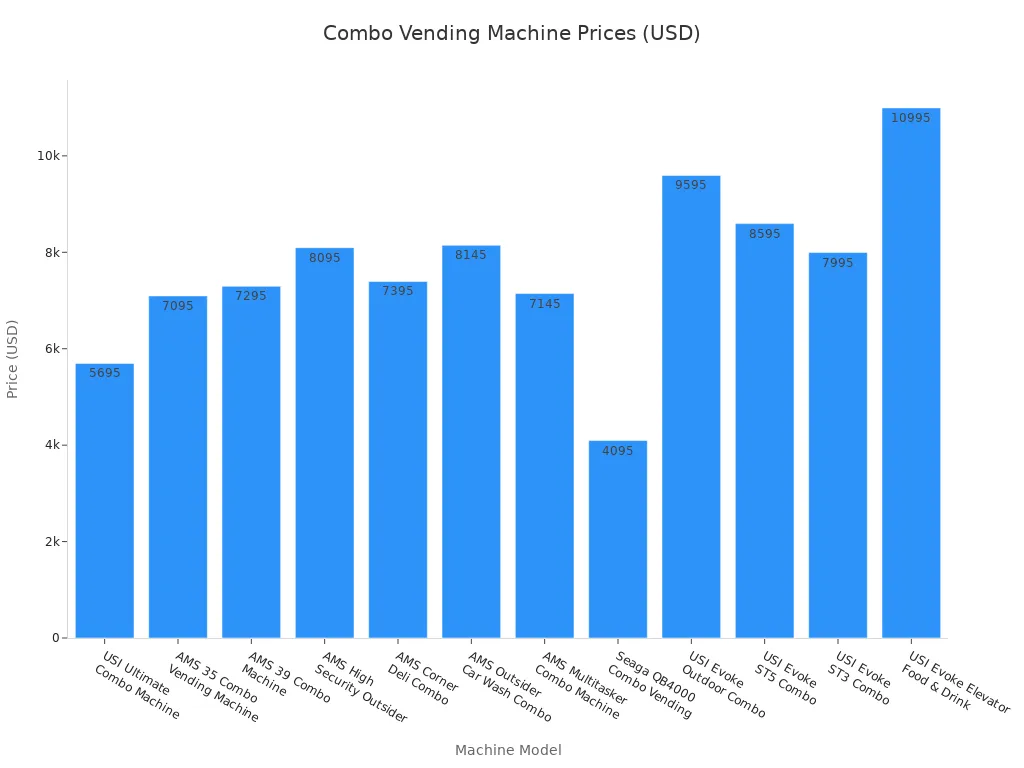Vending Machine Pricing: New vs. Used Models

Choosing between new and used machines shapes your vending machine business from day one. New models often bring advanced features and greater reliability, but they require a larger business investment. Used machines cost less, making it easier for you to start in the vending machine business, but you may face more repairs. Vending Machine Pricing affects your business plans and profits. You want every dollar spent to help your business grow. Smart choices lead to a stronger vending machine business.
Key Takeaways
New vending machines cost more but offer the latest features, better reliability, and full warranties that reduce repair worries.
Used vending machines are cheaper upfront and help you start with less money, but they may need more repairs and have limited or no warranty.
Choose new machines for busy, high-traffic locations and if you want advanced technology like cashless payments and smart tracking.
Used machines work well for small budgets, testing new locations, or if you can handle repairs yourself to save money.
Consider your budget, business goals, location, and maintenance skills carefully to pick the vending machines that fit your needs best.
New vs. Used Machines

Quick Overview
When you start a vending business, you face a big choice: new vs. used machines. Each option has strengths and weaknesses. New vending machines bring the latest technology and features. Used vending machines cost less and help you get started with a smaller budget. You need to think about your goals, your budget, and how much time you want to spend on repairs.
Here is a quick comparison:
Feature | New Vending Machines | Used Vending Machines |
|---|---|---|
Price | Higher | Lower |
Technology | Latest | Older |
Reliability | Very reliable | Varies |
Warranty | Full warranty | Limited or none |
Maintenance | Less frequent | More frequent |
Customization | Easy | Limited |
Tip: Always match the machine to your business needs. The right choice can help you grow faster.
Who Should Buy New?
You should consider new vending machines if you want the best features and the least hassle. Many buyers choose new models because they offer advanced options like cashless payment systems, touchscreen displays, and smart inventory tracking. These features help you meet modern customer demands and make your business run smoothly.
New vending machines often come with:
Cashless payment options for credit cards and mobile wallets
Touchscreen interfaces that attract more users
Energy-saving LED lights and efficient cooling systems
Full warranties that cover repairs and reduce downtime
Custom branding and flexible product setups
You may pay more upfront, but you get peace of mind. New models break down less often and use less energy. If you want to impress business partners or place machines in high-traffic locations, new vending machines can help you stand out. Many business owners see them as a smart investment for long-term success.
Who Should Buy Used?
Used vending machines work well if you want to save money at the start. These models cost much less than new ones. You can often find used vending machines for 30% to 70% less than new models. This lower price lets you buy more machines or try out different locations without spending too much.
You should look at used vending machines if:
You have a small budget or want to test the business before spending more
You do not need the latest technology or features
You feel comfortable fixing simple problems or finding spare parts
You want to place machines in low-risk or low-traffic areas
Used models may not have cashless payment systems or smart software. They may need more repairs and have limited or no warranty. Still, many business owners start with used vending machines to learn the business and see what works. If you choose carefully and inspect each machine, you can get a good deal and earn profits faster.
Note: Always check the condition and age of used vending machines before you buy. Ask for service records and test every feature.
Vending Machine Pricing

New Vending Machines
When you look at new vending machines, you see a wide range of prices. The vending machine pricing depends on the type of machine and the features you want. Most new models cost between $1,000 and $30,000. Snack and beverage machines usually fall on the lower end, while combo machines and machines with advanced technology cost more.
Here is a purchase price breakdown for some popular new combo vending machine models in the United States:
Combo Vending Machine Model | Price Range (USD) |
|---|---|
USI Ultimate Combo Machine | $5,695 |
AMS 35 Combo Vending Machine | $7,095 |
AMS 39 Combo Machine | $7,295 |
AMS High Security Outsider Combo (Red) | $8,095 |
AMS Corner Deli Combo Machine | $7,395 |
AMS Outsider Car Wash Combo Vending Machine | $8,145 |
AMS Multitasker Combo Machine | $7,145 |
Seaga QB4000 Combo Vending Machine | $4,095 |
USI Evoke Outdoor Combo Machine | $9,595 |
USI Evoke ST5 Combo Machine | $8,595 |
USI Evoke ST3 Combo Machine | $7,995 |
USI Evoke Elevator Food & Drink Combo | $10,995 |

You can see that combo models often cost between $4,095 and $10,995. If you want the latest features, the vending machine cost will be higher. New vending machines give you the newest technology, better energy efficiency, and full warranties. These benefits make them a strong investment for many business owners.
Used Vending Machines
Used vending machines offer a much lower entry point for your business. Most used models cost between $150 and $3,000. This lower price makes it easier for you to buy several machines or try different locations. Used vending machines are often 30% to 70% less expensive than new ones. You can find snack, beverage, and combo machines in the used market, but the price depends on the age, condition, and features of each machine.
You might find a basic snack or soda machine for as little as $150 if it is older or needs repairs. Newer used models with more features or better condition can cost closer to $2,000 or $3,000. Used vending machines help you lower your initial investment and reach profitability faster. However, you may need to spend more time and money on repairs or upgrades.
Note: Always inspect used vending machines before you buy. Check for working parts, clean interiors, and working payment systems.
Price Influencers
Many factors affect vending machine pricing. The type of machine, its age, and its features all play a role. Here are some key things that can change the price:
Type of Machine: Snack, beverage, and combo models have different price ranges. Combo machines usually cost more because they offer more options.
Features: Adding cashless payment systems, such as card readers or mobile payment options, can increase the vending machine cost by $100 to $300. These features make your machines more attractive to customers and can boost your sales. You will also pay a small transaction fee, usually 2% to 5% per sale.
Condition: New vending machines cost more because they come with warranties and the latest technology. Used vending machines cost less, but you may need to pay for repairs or upgrades.
Brand and Model: Well-known brands and newer models often have higher prices. Older or less popular models usually cost less.
Location and Shipping: If you need to ship machines a long distance, the price will go up. Local purchases can save you money.
Tip: Think about your business goals and budget before you decide which vending machine models to buy. The right choice can help you grow your business and get a better return on your investment.
Cost Comparison
Upfront Costs
When you start your vending business, you face the initial investment right away. New machines have a higher price, often ranging from $1,000 to $30,000. Used machines cost much less, sometimes as low as $150. This lower initial investment lets you buy more machines or test different locations. You need to consider the vending machine cost and how it fits your budget. A cost-benefit analysis helps you see if the extra features of a new machine are worth the higher initial costs. Many owners choose used machines for the cost savings, but you should always check the condition before you buy.
Maintenance & Repairs
Operational costs do not stop after you buy the machine. New vending machines usually have lower maintenance and repair costs over five years. You might spend $100 to $300 each year on routine care, like cleaning and replacing parts. Used machines often need more repairs because of older parts and less efficient technology. These extra operational costs can add up and affect your savings. New machines use energy-efficient designs, which help lower your utility bills and reduce vending machine cost over time. Regular maintenance keeps your machines running and helps you avoid lost sales.
Hidden Expenses
You will find hidden expenses in both new and used machines. These include:
Installation and setup fees
Accessories and extra parts
Energy costs
Location or rental fees
Insurance and taxes
Merchandise and supply costs
Downtime from repairs or spoiled products
These operational costs can surprise you if you do not plan for them. Used machines may save you money at first, but higher repair bills and more downtime can slow your return on investment. New machines often have fewer hidden costs, but you still need to watch your spending. A careful cost-benefit analysis helps you balance initial investment, operational costs, and long-term savings. If you place your machines in busy spots and keep them stocked, you can reach your ROI faster and enjoy better cost savings.
New Vending Machines: Pros & Cons
Reliability
You want your vending business to run smoothly. New vending machines give you strong reliability. These machines come straight from the factory, so you do not have to worry about worn-out parts or hidden problems. Most new models use advanced engineering and high-quality materials. You will see fewer breakdowns and less downtime. This means your machines keep selling products and making money. When you place a new machine in a busy spot, you can trust it to work every day. Reliable machines help you build trust with your customers.
Features & Technology
Modern vending machines offer many features that improve your business. You can find machines with cashless payment systems, touchscreens, and smart inventory tracking. These features make it easy for customers to buy snacks or drinks. You can also check sales and restock needs from your phone or computer. New vending machines often use energy-saving lights and cooling systems. These upgrades lower your power bills and help the environment. When you use the latest technology, you create a better customer experience and stand out from your competition.
Tip: Choose machines with features that match your business goals. The right technology can help you grow faster.
Warranty
When you buy a new vending machine, you get a strong warranty from the manufacturer. Most companies offer a one-year warranty for indoor use. This covers parts and refrigeration systems on cold and frozen glass front machines. Some models, like Futura, come with a five-year pro-rated warranty. The first year gives you full coverage, then coverage drops each year. Warranties only apply to new equipment and do not transfer if you sell the machine. They do not cover damage from abuse or normal wear items like bulbs and fuses. If you need repairs, you may have to pay for shipping and reinstallation.
Warranty Aspect | Details |
|---|---|
Standard Warranty Duration | 1 year manufacturing warranty for indoor use |
Coverage | Parts and refrigeration systems on cold and frozen glass front vending machines |
Extended Warranty (Futura Models) | 5-year pro-rated warranty: 1st year full, then 80%, 60%, 40%, 20% coverage each year |
Applicability | New equipment only, non-transferable |
Exclusions | Damage from abuse, wear items (paint, bulbs, fuses), improper installation |
Customer Responsibilities | Removal, reinstallation, and shipping costs for repairs |
A good warranty protects your investment and gives you peace of mind. You can focus on growing your business instead of worrying about repair costs.
Used Vending Machines: Pros & Cons
Lower Cost
Used vending machines give you a chance to start your business with less money. You can find many models for a much lower price than new machines. This makes them a budget-friendly alternative for people who want to enter the vending business. You might pay only a few hundred dollars for a machine that works well. These lower prices let you buy more machines or try out different locations. Many business owners like the cost savings because it helps them see profits faster. You can use your savings to buy extra stock or improve your business in other ways.
Tip: If you want to grow your vending business quickly, used vending machines can help you stretch your budget.
Maintenance Risk
You need to think about repairs when you buy used vending machines. Older machines may break down more often. You might have to fix coin mechanisms, motors, or cooling systems. Sometimes, you will need to find replacement parts that are hard to get. These repairs can take time and money. If you do not have experience with fixing machines, you may need to hire someone to help. This can eat into your savings. You should always check the machine before you buy it. Look for signs of wear and test every feature. Good maintenance can keep your machines running, but you must be ready for extra work.
Limited Warranty
Most used vending machines come with little or no warranty. You usually buy them "as-is," which means you take on the risk if something goes wrong. Here is how warranties for used and new machines compare:
Used vending machines are typically sold "as-is" without any warranty or guarantee of performance. You must pay for any repairs yourself.
New vending machines usually come with a manufacturer's warranty that covers defects and malfunctions. This gives you financial protection and peace of mind.
New machines often include customer support for troubleshooting and maintenance. Used machines rarely offer this kind of help.
You need to plan for possible repair costs when you choose used vending machines. The lack of warranty means you must rely on your own skills or pay for service if problems come up.
Decision Factors
Budget
Your available budget shapes your vending machine business from the start. If you have a limited budget, you often look at used machines because they cost less upfront. This choice helps you enter the business quickly and test different locations without a big investment. However, you may face higher maintenance costs and more downtime, which can affect your profits and restocking schedule. If you have more funds, you might choose new machines. These offer warranties, better reliability, and modern features that lower restocking costs and improve your return on investment. New machines also give you access to energy-saving technology and better financing options. Your budget usually guides you toward the best fit for your business goals.
1. Small budgets favor used machines for lower initial costs. 2. Used machines may lead to higher long-term expenses. 3. New machines require more investment but offer reliability and advanced features. 4. New models can help you save on repairs and restocking over time. 5. Your budget often decides if you focus on upfront savings or long-term value.
Business Goals
Your business goals help you decide between new and used vending machines. Many operators want to balance saving money at the start with making steady profits and keeping machines running. If you want to test new markets or start small, used machines give you flexibility and lower risk. If you aim for long-term profits, fewer repairs, and better customer service, new machines support these goals. New models offer features like cashless payments, inventory tracking, and analytics. These tools help you manage restocking and boost profits. You also get better data analytics to track sales and improve your business strategy.
Startups often pick used machines for lower risk and cost.
Owners focused on growth and customer satisfaction choose new machines.
New machines support operational efficiency and advanced analytics.
Used machines work well for piloting locations or high-traffic areas with less risk.
Location
Where you place your vending machines matters. High-traffic areas need reliable machines that can handle frequent restocking and heavy use. New machines work best in these spots because they break down less and offer features like cashless payments and real-time analytics. If you plan to put machines in offices, schools, or busy public places, new models help you keep up with demand and avoid lost sales. Used machines fit better in low-traffic or test locations where restocking is less frequent and downtime has a smaller impact on your business. Always match your machine choice to the location’s needs and your business plan.
High-traffic areas benefit from new machines with advanced features.
Used machines suit low-risk or low-traffic locations.
Reliable machines in busy spots help you maximize profits and restocking efficiency.
Maintenance Skills
Your ability to maintain and repair vending machines affects your business success. If you have strong maintenance skills, you can save money by buying used machines and fixing issues yourself. This approach helps you control restocking and repair costs. If you lack technical skills, new machines offer peace of mind with warranties and customer support. You spend less time on repairs and more time on restocking and growing your business. Consider your comfort level with repairs before you choose between new and used machines.
Tip: If you want to focus on analytics, restocking, and profits, pick machines that match your maintenance skills and business goals.
Vending Machine Business Tips
Evaluating Suppliers
Choosing the right supplier is a key step in your vending machine business. You want a partner who supports your goals and helps you grow. Start by checking the supplier’s reputation. Read customer reviews and ask for references. A good supplier has a strong track record in the vending industry. Look for companies with years of experience and industry certifications. These show a commitment to quality.
Ask about the types of machines they offer. Make sure they have models with cashless payment options, remote monitoring, and inventory management. These features help you track sales and restocking needs. Review their pricing and contract terms. You want clear costs and fair conditions. Good after-sales support is important. Reliable service keeps your machines running and reduces downtime. Interview suppliers and ask about their experience, machine features, and maintenance services. This helps you find a supplier who fits your business.
Tip: A reliable supplier helps you avoid problems and supports your vending machine business as you expand.
Avoiding Pitfalls
You can avoid many problems by inspecting machines before you buy. Always check used machines in person. Look at the physical condition. Make sure the machine is clean and works well. Test if it accepts credit cards or mobile payments. This makes restocking and sales tracking easier. Ask for sales data and check the age of the equipment. Confirm that the machine works as promised.
Review contracts with location owners. Secure placement before you buy. Ask about foot traffic at each site. High-traffic spots mean more sales and more restocking. Understand all costs, including commissions and inventory expenses. Ask why the seller is leaving the business. This can reveal hidden issues.
For first-time buyers, start with used machines. This lowers your risk. Once you find a profitable location and learn the restocking process, you can invest in new machines. Careful planning and regular restocking help your vending machine business succeed.
Choosing between new and used machines shapes your vending machine business in unique ways. Review the table below to see how each option compares:
Factor | New Machines | Used Machines |
|---|---|---|
Budget | Higher upfront cost | Lower initial investment |
Reliability | More reliable, less downtime | Higher maintenance risk |
Features | Latest technology, customization | Limited features, older technology |
Warranty | Manufacturer support | Usually sold as-is |
You should match your vending machine business choice to your goals and risk level. Think about your budget, location, and maintenance skills. For the best results, talk to suppliers or experts before you invest. Share your questions or experiences about the vending machine business in the comments below!
FAQ
What is the average lifespan of a vending machine?
You can expect a vending machine to last 10 to 15 years. New machines often last longer with regular care. Used machines may need more repairs as they age.
Can you upgrade a used vending machine with cashless payment systems?
Yes, you can add cashless payment systems to many used machines. You may need a compatible model and a professional installer. This upgrade usually costs $200 to $500.
How often should you service your vending machine?
You should check and clean your vending machine every month. Regular service helps prevent breakdowns and keeps your machine running smoothly. Always fix small problems quickly.
Is it better to start with one machine or several?
Starting with one machine lets you learn the business and reduce risk. You can add more machines as you gain experience and find good locations.
